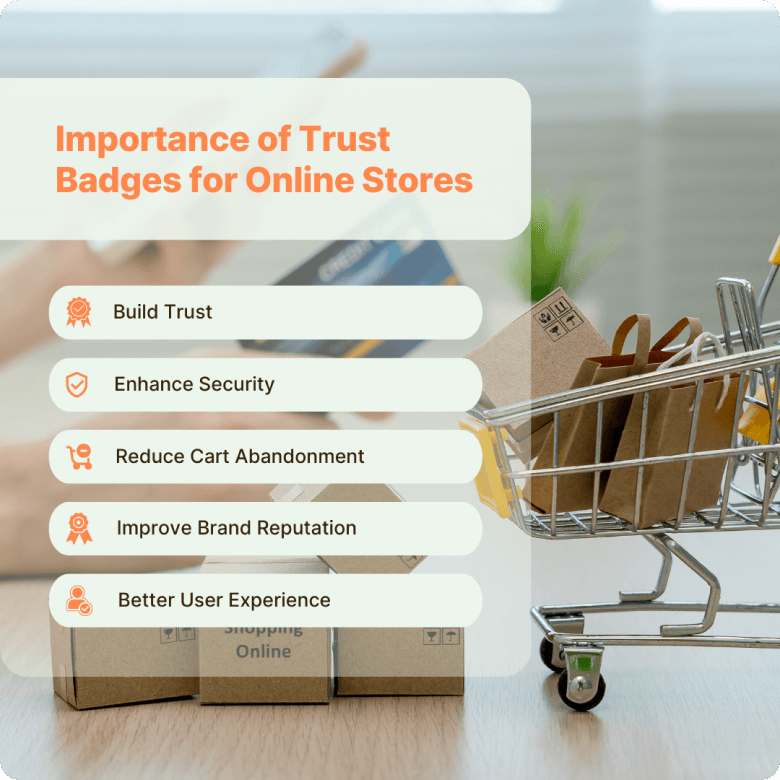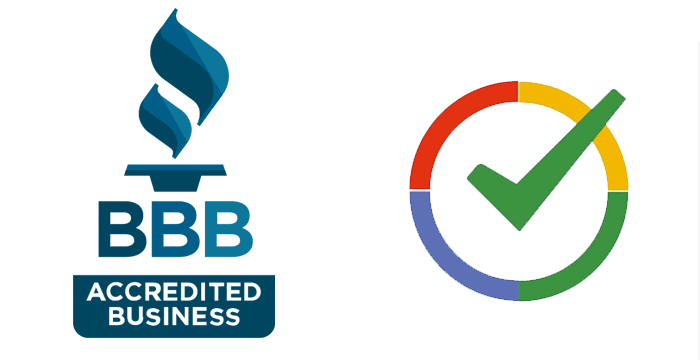Building trust among customers in the digital marketplace is crucial for business growth. Because 81% of consumers feel concerned while shopping on an eCommerce site they don’t know. This lack of trust leads to lower conversion rates and cart abandonment.
Without trust, potential customers might hesitate to make a purchase, share personal information or even engage with your website. That’s where trust badges play a significant role in influencing purchase decisions and ultimately increasing conversion rates.
In this blog, we’ll explore the 12 best trust badges that help enhance your site’s credibility and encourage visitors to make a purchase. But first, let’s dive deep into understanding what trust badges are.
What are Trust Badges?

A Trust badge is a website icon or symbol to build trust and credibility among visitors. While you might not be familiar with the term, symbols like security badges, payment badges, money-back guarantee badges, and customer review badges can be seen on many websites.
Since online purchases happen without interaction with a storekeeper, these badges serve as visual cues to assure the trustworthiness of your eCommerce sites. By displaying trust badges, businesses can enhance credibility, increase sales, and drive high conversion rates.
Importance of Trust Badges for Online Stores
Potential customers might leave your site during the checkout page for several reasons, not because of the product in their cart. However, one reason can be a lack of trust or feeling unsafe handing over the payment details while purchasing.
Trust badges are not only visually appealing symbols on your website; they help to instill trust among customers. It is especially important for sites that handle customer’s data or payments. Trust badges can positively influence customers’ decisions and build confidence among them.
Below, you can see why trust badges are essential.

Build Trust – One of the trust factors for customers is social proof. Trust badges act as social proof approved by a reputable third party, signaling that the website is safe and secure, increasing trust in your brand.
Enhance Security – Displaying security badges from recognized authorities, such as SSL certificates, assures customers that their data is secured and protected. That fosters trust and alleviates the concern about data security.
Reduce Cart Abandonment – Lack of trust is a major reason for cart abandonment. Trust badges help mitigate this concern, instill confidence among potential customer, and make them complete their purchase.
Improve Brand Reputation – Displaying trust badges shows that your website is genuine and takes customer security seriously. That makes a positive and safe experience with your site, making them merely likely to return and become a loyal customer.
Better User Experience – Relevant trust badges significantly enhance user experience by creating a sense of security and reliability. When users feel secure and trust your site, they are more likely to explore it and improve conversion.
Trust badges are vital tools to boost trust, enhance user experience, and educate the audience about your credibility, ultimately increasing sales and interaction with your brand.
How Trust Badges Increase Your Sites’ Conversions
As per a study by Baymard Institute, adding a trust badge can significantly improve the conversion rate by as much as 42%. Trust badges are key in enhancing a website’s credibility and encouraging visitors to take desired actions.
Displaying different trust badges, like SSL badges, informs visitors that your site encrypts data, safeguarding personal and payment information. Similarly, showing logos of trusted payment methods, like PayPal badges, Visa, and Mastercard, reassures customers that their transaction is processed securely.
Further, third-party endorsements from well-known organizations enhance your site’s credibility and increase trust and user experience. That makes visitors feel comfortable and establishes your website as an authority in your field.
For example, a trust badge from an ISO certification can convey that your business practices meet certain standards and encourage them to convert.
Trust badges tap into the psychological principle of familiarity. Making visitors comfortable and trusting towards familiar things improves trustworthiness, leading to higher conversion rates.
Types of Trust Badges To Boost Conversion Rates
Trust badges matter most for eCommerce sites as they build trust and confidence among new visitors. In other words, the symbols or icons help visitors to know your authenticity and credibility, influencing their decision to make a purchase.
Here are the 10 best trust badge to add on your website to improve conversion rate.
1. Free Shipping and Returns Badge
Free shipping badges assure customers that you offer free shipping; they can return or receive the product without extra or hidden charges. These badges effectively reduce the shopping cart abandonment rate by eliminating the common reason for unexpected shipping charges during checkout.
By displaying a free shipping trust badge, you can build trust and credibility among the customers, enhancing their overall shopping experience. Customers feel more assured to make a purchase, knowing there won’t be any hidden cost, leading to increased sales and higher conversions.
You can place a free shipping badge anywhere on the website, but it’s more sales-worthy to display it on the checkout page. Here’s an example from Neeman’s free delivery badge placed at checkout.

2. Secure Checkout Badges: Ensuring Payment Security
A secure checkout badge assures customers that your website takes advanced security measures, such as encrypting data and secured payment gateways to protect customers’ personal and financial information.By displaying a secure checkout badge, you alleviate the concern about data breaches and fraud, which are barriers to completing online transactions. Display it on checkout pages and reassure the customer that their sensitive information is safe, making them proceed with their purchases.
It helps to boost conversion rates by ensuring customers feel safe and secure while shopping on your site.

3. Money Back Guarantee Badges: Promising Customer Satisfaction
Money-back guarantee badges ensure a refund policy, assuring potential customers that they can make a purchase and that if they are not satisfied with the product or service, they can get their money back.That builds confidence in your visitors encouraging them to complete the transaction. Knowing they can return the product makes them comfortable and more secure. That leads to higher sales and reduced cart abandonment, enhancing customer trust and driving conversion.
Here’s an example of a 60-day money-back guarantee badge.

4. Accepted Payment Badges: Displaying Payment Flexibility
Accepted Payment trust badges are another type of trust badges that can boost conversion rates by indicating the payment options accepted on your eCommerce store, such as Visa, MasterCard, PayPal, or other popular methods.They assure customers that their preferred and trusted payment methods are available, instilling confidence in potential customers and making them likely to complete their purchases. Adding a secured payment badge addresses security concerns and communicates that your site uses a trusted payment process to handle customer data safely.

5. SSL certificate Trust Badge
This is one of the most common trust badges for websites that enhance security and build customer trust. If your eCommerce site isn’t using an SSL certificate, the users will be greeted with a message that their data isn’t handled securely.For the Secure Socket Layer, SSL encrypts data transferred between the user’s browser and the server, ensuring their sensitive information remains secure and private. Having SSL trust badges reassured customers that your site is secure and increases trust in your eCommerce website.

6. Review Badges
Review badges allow you to showcase your business’s reviews from different websites or platforms and create trust with your visitors. Review Badges features reviews, ratings, and testimonials from satisfied customers, providing social proof to boost conversion rate.There are several customer review badges, such as star ratings, percentage ratings, review count, testimonials, and reviews from other platforms such as Trustpilot, Google, Yelp, and more. These review badges on your eCommerce store reinforce trust and indicate that the reviews are from verified purchasers, enhancing credibility.
Here’s an example of Review badges from WiserNotify.

7. Industry Award Trust Badges
These trust badges signify that a company or its products have received recognition or awards from reputable organizations or publications. These small third-party endorsement badges help to build trust, assuring potential customers that the business is reputable and recognized by industry experts.These badges increase online shoppers’ confidence and trust, indicating that your company’s products are reliable. Badges like “Best Tech Product of the Year” can reflect your strength in the industry.
Here’s an example of Industry Award Trust Badges from Thrive Agency.

8. Social Media Trust badges
Social media icons on your eCommerce business website serve as trust badges that instil trust and credibility among the website visitors. Simply adding trust badges lets users contact you in different ways and increases the reputation of your eCommerce store.Displaying a social media trust badge can set your business apart from competitors who may not have this recognition and give you higher visibility in search results. A verified business badge from Google My Business and icons of platforms like Facebook, Instagram, LinkedIn, and Twitter indicate your e-commerce business is authentic and verified.
Here’s an example of Social Media Badges from Wix.

9. App-Store Trust Badges
These app store icons help build trust and confidence among website visitors by indicating that your software or service is available from reputable companies. The presence of app store trust badges assures users that it is reviewed by the app store, signifying reliability and safety.
Displaying app store badges associated with Apple Play Store and Google Play Store increases conversion rates and engagement. For example, Amazon’s app store badges.

10. Customer Logo Trust Badges
Showcasing industry awards adds trust, featuring the logos of well-known companies you’ve worked with, and helps build trust and brand reputation among potential customers. It shows that other brands have trusted your business to enhance credibility among them.
Featuring customer logos helps portray a professional image, showing your business can serve prominent clients and trigger a Fear of Missing out. For example, Clutch shows the logos of brands that use the platform to connect with the right business partner.
Trust badges are a huge asset that helps to build trust and confidence among website visitors help you increase sales, and reduce cart abandonment. Use them to help you grow your business and turn customers into loyal ones.

11. Third-party Endorsement Badge
Endorsement badges come from recognized third parties like industry associations or review sites, indicating credibility and trustworthiness.
Often displayed on homepages, product pages, or checkout pages to leverage the reputation of the endorsing entity. Enhances trust by showcasing external verification of quality or security standards.
Example: Badges from Better Business Bureau (BBB), Trustpilot, or industry-specific certifications.

12. PayPal Badge
PayPal badges indicate that the website accepts PayPal as a payment method, leveraging PayPal’s reputation for secure transactions.
Near payment options on checkout pages or throughout the website to promote PayPal as a trusted payment method.
Example: PayPal logo with text like “Pay with PayPal” or “Verified PayPal Merchant”.

How to Choose the Right Trust Badges for Your Online Store
Most trust badges are essential as they help to drive conversions for your store. Selecting the right trust badge can help you build credibility, enhance customer confidence, and increase sales for your eCommerce store. Below, Guide to help you choose the most effective trust badges.
Understand your Customer’s Concern
Ensure you understand your customers’ common concerns and doubts while selecting the trust badges. They might be worried about payment, security, product quality, return policies, or other concerns.
Types of Trust Badges
You might be a new store, and it might be difficult for the website visitors to trust and shop from your store. They might be concerned about the website’s online security, online payments, and prices.
Different free trust badges are available to address your customers’ concerns. Some common include SSL certificates, secure payment badges, security badges, Money back guarantee badges, Free Shipping badges, safe checkout badges, customer reviews, and many more.
Prioritize Relevance
Choose trust badges that are most relevant to your industry and customers. For instance, if you are running an eCommerce store, secure payment, an SSL badge, a money-back guarantee badge, a best price guarantee, and a free shipping badge might be essential for you. On the other hand, if you are running a service-oriented website, customer reviews, industry awards, and an app store app badge might be essential.
Ensure Authenticity
Make sure to use genuine and recognized badges from the trusted organization. For example, using a security badge from McAfee Secure adds assurance of security measures taken at checkout. Make sure to avoid using fake or unverified badges, as they can harm the authenticity of your website.
Display Strategically
Place your trust badges strategically to get the most impact, such as on the home page, product pages, and checkout pages, instilling customer trust and credibility.
Choosing the right trust badges or trust seals for your online store involves understanding your audience’s concerns, using authentic badges, and displaying them strategically to maximize their impact.
You can significantly improve customer satisfaction and increase sales by selecting the right ones.
Conclusion
Trust badges are a powerful tool for your website to build trust among visitors. They are worthy to help overcome potential customers’ doubts and increase sales for your online store. You can effectively address customer concerns and build confidence by carefully selecting and placing trust badges such as SSL certificates, secure payment badges, money-back guarantees, customer reviews and more.
These trust badges reassure potential buyers about the security and reliability of your website, differentiating your business from the competitors. As you incorporate trust badges, remember to keep them updated and authentic to maintain their effectiveness.
Trust badges are crucial to improving conversions, building customer loyalty, and enhancing customer experience for business growth.

